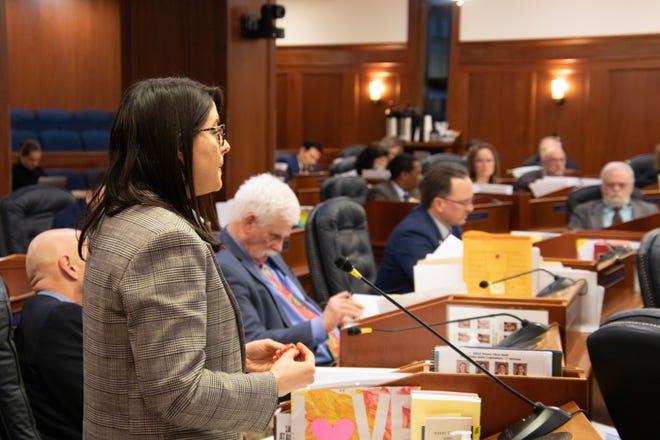Alaska lawmakers exchanged emotional and often combative remarks for more than 17 hours over the weekend over an anti-trans bill that would restrict student participation in sports teams from kindergarten to college. The bill was ultimately passed by the Alaska House of Representatives late Sunday night.
Democratic minority lawmakers introduced several amendments to the 88-filed bill last week and filed various motions to block its progress as House members canceled weekend work. . The bill passed the House by a vote of 22-18.
Under the new law, students will be required to play on teams according to their sex at birth. A similar ban already exists in Alaska's high schools, and was implemented after board members appointed by Governor Dunleavy voted in June 2023.
“If you want to set a precedent where you just introduce a minority amendment because you don’t like it, you’re going to be reaping what you’ve sown for years to come, Mr. Speaker,” Democratic House Minority Leader Leader Calvin Schrage said. “The underlying bill is so extensive that I intend to vote against it. [expletive]'' Mr. Schrage said, but House Speaker Kathy Tilton interrupted the reprimand to tell Mr. Schrage to sit down.

Several Democratic lawmakers expressed concerns about the bill's policy and financial burden on schools to determine students' birth sex. It also said it would necessarily require states to violate their own privacy laws. Additionally, they argued that the bill would expose schools and states to litigation regarding equal protection and Title IX of the Federal Constitution, which applies to state-funded educational institutions.
Preparing to vote: See who's running for president and compare their positions on important issues with our voter guide
The bill's sponsor, Republican Rep. Jamie Allard, defended the bill, saying the bill's interpretation of biological sex at birth is based on science and is not discriminatory. Last week, she proposed amendments to the bill's language that would apply to children's hormonal profiles and “unambiguous genitalia,” with clear consideration for children born intersex. Many supporters of the bill say it would level the playing field for female student-athletes.

“I've spoken with other attorneys who have reviewed this bill, and on its face this bill completely violates the Equal Protection Clause of the Alaska Constitution,” Democratic state Rep. Andy Josephson said in a statement.
“There could be lawsuits, lawsuits, birth certificate checks, and this is a 6-year-old child, but it's government overreach,” Rep. Josephson said before the bill is voted on on May 12. ” he said.
In his final remarks before lawmakers voted on the bill Sunday, Rep. Allard said the Democratic minority is pushing a false narrative.

“They're saying that this bill provides for a general genital examination. Wow, Madam Speaker. That's terrible, absolutely insane,” Allard said, adding that the opposing Democratic minority members believe the truth. He implied that it was not.
“The narrative that is being broadcast to all Alaskans across this great state is an attempt to use a strategy of fear. Nowhere in this two-and-a-half page bill does it say anything about genital exams. .That's not true at all,'' Allard added.
Allard did not further elaborate on how schools would address the state's new requirement to segregate students based on “distinct genitalia.” Many opponents argued that not all states have matching laws on how to change, update, or replace birth certificates after birth, making it difficult for schools to coordinate policy responses.

Rep. Jenny Armstrong said on May 11 that cisgender girls, or girls who are not transgender, may be subject to unnecessary scrutiny regarding their biological sex in sports disputes. The proposed amendment would limit the bill's application to students in eighth grade and above. She argued that it was unfair to young children to be subjected to an investigation by a panel of adults trying to determine whether they were transgender.
“I'm a fan of Sex Education Madam Speaker, but I think it needs to be age-appropriate. And we can take really inappropriate, really adult conversations and bring it to kindergarteners. I think we’re trying to apply it,” Armstrong said. He identifies as pansexual and wrote many of the amendments he opposed over the past few months.
Armstrong acknowledged the bill is unlikely to pass the Senate, but stressed the importance of sending a message to Alaskans about which side of history they want to be on. “A vote is a futile debate, and the statements made in this chamber today are not about whether we want to see this bill passed, but about the legacy each of us chooses to leave on this issue.” she added before her speech. She passionately opens up about her own experiences with anti-LGBTQ+ propaganda.

“I want to teach my sons not only to excel in their own sports in their own athletic performance, but also to respect the dignity of women. This comes down to the dignity of each individual. But I think we missed that in this conversation, said Republican Rep. Sarah Vance, co-sponsor of the bill.
Rep. Aries Galvin (N/A) opposed the bill, saying, “It's heartbreaking. We must do better in terms of furthering the recognition and understanding that these are human beings. We need to recognize that they are not just victims of hatred or subject to restrictive laws. These are people with very unique standards.”


